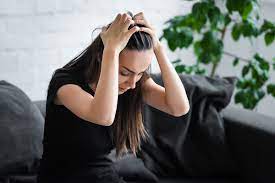Depression is a mental illness that affects millions of people around the world. While there are many different types of depression, chronic depression is one of the most serious. Chronic depression can lead to a number of other health problems, and it can be very difficult to treat. In this blog post, we will discuss the symptoms, treatment, and prevention of chronic depression. So, keep reading on!
Contents
What Is Chronic Depression?
 Chronic depression is a type of depression that lasts for a long time. It can last for years, or even a lifetime. Chronic depression is different from major depression, which is a short-term mental health problem. It is basically described as a long-term problem with a depressed mood.
Chronic depression is a type of depression that lasts for a long time. It can last for years, or even a lifetime. Chronic depression is different from major depression, which is a short-term mental health problem. It is basically described as a long-term problem with a depressed mood.
Chronic depression is also called dysthymia or persistent depressive disorder (PDD). PDD is a milder form of chronic depression. People with dysthymia may have trouble functioning in their daily lives. But they do not have the same severe symptoms as people with major depression.
According to studies, chronic depression is more common in women than men. It is also more common in people who have a family history of depression. This type of depression can happen at any age, but it often begins in adulthood. So, it is important to be aware of the condition and its consequences. In that way, you will be able to treat it more effectively.
What Are the Symptoms of Chronic Depression?
The symptoms of chronic depression, also known as dysthymia, are similar to those of major depression. However, they’re less severe and last longer-at least two years. Symptoms may include:
- Feeling down, sad, or hopeless most of the time
- Losing interest or pleasure in activities you once enjoyed
- Having low energy levels
- Trouble concentrating, making decisions, or remembering things
- Changes in appetite or weight
- Sleeping too little or too much
- Feeling worthless or guilty
- Having persistent physical symptoms that don’t respond to treatment, such as headaches or digestive disorders
- Thinking about death or suicide, with or without a specific plan.
If you have any of these symptoms, see a doctor or mental health professional. With treatment, you can feel better.
Chronic depression is a common but serious mood disorder. It’s not the same as occasional blue moods. If you have chronic depression, it interferes with your daily life. And causes pain for both you and those who care about you.
What Causes Chronic Depression?
There are many potential causes of chronic depression. Some of these include:
- A history of depression: If you have previously been diagnosed with depression, you are more likely to experience it again.
- Genetics: Depression can run in families, so if your parents or grandparents had it, you may be more likely to as well.
- Certain medical conditions: Some physical illnesses like thyroid problems or cancer can lead to depression.
- Brain changes: People with chronic depression may have different brain structures or chemistry than those without it.
- Stressful life events: Loss of a loved one, financial troubles, or job stress can trigger depression.
These are some of the most common causes. But it is important to remember that everyone experiences depression differently. In fact, it is likely that there are many factors involved.
Moreover, chronic depression can make everyday activities seem more difficult. You may find it hard to concentrate at work or school, stick to a healthy routine, or even get out of bed some days. If you are struggling with chronic depression, know that you are not alone. There are many resources available to help you cope and feel better.
What Are The Consequences Of Chronic Depression?
 There are many consequences of chronic depression. Some of the impacts include:
There are many consequences of chronic depression. Some of the impacts include:
- Decreased productivity at work or school
- Strained personal relationships
- Problems with memory and concentration
- Increased anxiety and restlessness
- Fatigue and sleep problems
- Changes in appetite, leading to weight loss or gain
- Persistent aches or pains, headaches, cramps, or digestive problems
- Thoughts of death or suicide
- Substance abuse
Chronic depression can also lead to:
- absenteeism,
- tardiness,
- and presenteeism.
When productivity at work or school suffers, it can have a ripple effect on other aspects of life. For instance, financial problems may arise from decreased productivity and job performance. Relationship difficulties may develop due to communication problems, lack of interest, or fatigue.
So, overall this condition can cause a great deal of suffering. If you think you may be depressed, it’s important to seek professional help.
How To Treat?
The treatment for chronic depression can be difficult, and it may take some time to find the right combination of therapies that work for you. However, some of the treatment options that are available include:
Psychotherapy
This is a type of therapy that can help you understand your depression and how to manage it. It is also known as talk therapy. Moreover, this therapy can be done in an individual, group, or family setting. It basically includes two types of psychotherapy, cognitive-behavioral therapy (CBT), and interpersonal therapy (IPT).
Cognitive-behavioral therapy helps you change the negative thinking and behaviors that are associated with your depression. Interpersonal therapy, on the other hand, focuses on your relationships and how they may be affecting your depression. Both therapies have been found to be effective in the treatment of chronic depression.
You can contact Mantra Care for more information on how to get started with psychotherapy. The team of experts in Mantra Care will be more than happy to help you. Book your free consultation today to learn more about our services!
Medication

There are different types of medication that can be used to treat chronic depression. Some of these include:
- Antidepressants
- Anti-anxiety medications
- Mood stabilizers
The medications for mental health disorders are usually prescribed by a psychiatrist. If you are thinking about starting medication for your chronic depression, it is important to talk to your doctor first. This is because there are some potential side effects that you should be aware of, some of these include:
- Nausea
- Dry mouth
- Headache
- Drowsiness
- Anxiety
- Weight gain or loss
You should also know that it takes around four to six weeks for the full effects of the medication to be felt. Therefore, it is important to be patient and not give up on the medication if you don’t see any results immediately.
Electroconvulsive Therapy
This is a type of therapy that is used in severe cases of depression. It involves passing electrical currents through the brain to trigger a seizure. More often than not, this therapy is used when other treatments have failed.
If you are considering electroconvulsive therapy, it is important to talk to your doctor about the potential risks and benefits. This is because there are some risks involved in this type of therapy, such as:
- Memory loss
- Confusion
- Muscle aches
- Headache
However, the therapy provides long-term relief for many people with chronic depression.
Find Support Groups
Support groups are a great way to feel less alone in your battle against chronic depression. They provide an opportunity to share your experiences with others who understand what you are going through. Many support groups also offer helpful advice and coping strategies from people who have been successful in managing their chronic depression.
There are a few different types of support groups that you can choose from. Some groups are led by a mental health professional, while others are peer-led. There are also online support groups available if you prefer not to meet in person. No matter what type of group you choose. Just make sure that it is one that you feel comfortable with and that meets your needs.
If you are struggling with chronic depression, it is important to seek help. There are many resources and treatments available that can help you manage your depression. Don’t hesitate to reach out for help!
What Are Some Prevention Tips?
 Prevention is somehow more difficult to address when it comes to chronic depression. This is because, as previously stated, chronic depression is often caused by an underlying condition. However, there are some tips that may help prevent the development of chronic depression more severe:
Prevention is somehow more difficult to address when it comes to chronic depression. This is because, as previously stated, chronic depression is often caused by an underlying condition. However, there are some tips that may help prevent the development of chronic depression more severe:
Learn The Condition
It is essential to get educated about chronic depression and learn as much as possible about the condition. This will help you to be more aware of the symptoms and know when to seek help. Also, it is believed that the more you know about a condition, the better equipped you are to manage it and prevent it from getting worse.
Find A Support System
A support system is key for anyone suffering from chronic depression. This could be a group of friends or family members who can offer emotional support. It is also important to find a therapist or counselor who can provide professional help.
Identify Your Triggers
It is essential to identify the things that trigger your chronic depression. Once you know what these triggers are, you can try to avoid them or be prepared for them when they do occur. In fact, some people find that keeping a journal helps them to identify their triggers and track their symptoms.
Get Exercise Daily
Exercise is not only good for your physical health but also your mental health. It has been shown to help improve mood and reduce stress. Therefore, it is important to make sure that you are getting some form of exercise every day, even if it is just a brisk walk around the block.
Eat A Healthy Diet
 What you eat can also affect your mood. Eating a healthy diet that is rich in fruits, vegetables, and whole grains can help to improve your mood and reduce symptoms of depression. On the other hand, eating processed foods and junk food can make chronic depression worse.
What you eat can also affect your mood. Eating a healthy diet that is rich in fruits, vegetables, and whole grains can help to improve your mood and reduce symptoms of depression. On the other hand, eating processed foods and junk food can make chronic depression worse.
Limit Your Alcohol Intake
Although it may seem like alcohol can help you relax, it is actually a depressant. In fact, alcohol can actually make chronic depression worse. Therefore, it is important to limit your alcohol intake or avoid it altogether. Because chronic depression can be a difficult condition to manage. And with alcohol intake, it can be even more challenging.
Get Plenty Of Sleep
Sleep is also essential for mental health. Most adults need around eight hours of sleep per night. However, people with chronic depression may need more or less sleep. It is important to find the amount of sleep that works best for you and stick to a regular sleep schedule.
Practice Relaxation Techniques
These techniques are widely prescribed for the prevention and treatment of chronic depression. Relaxation techniques such as yoga, meditation, and deep breathing can help to reduce stress and improve mood. In fact, studies have shown that these techniques can be just as effective as medication for some people.
So, these are some healthy tips that can help you to prevent chronic depression from getting worse. If you or someone you know is suffering from chronic depression, please seek professional help. Remember, you are not alone. There are people who care about you and want to help.
Conclusion
To conclude, chronic depression is more than just feeling down or going through a difficult time. It’s a real, serious medical condition that can be debilitating and even life-threatening. Also, many people with this disorder don’t seek treatment because they don’t realize that their symptoms are part of a treatable condition.
If you think you may be suffering from this type of depression, please see your doctor or mental health professional. With proper treatment, most people with chronic depression can improve their quality of life. And, if you’re already receiving treatment, keep up the good work! You are on your way to recovery.
For more information, please contact MantraCare. Depression is a mental illness characterized by persistent feelings of sadness, hopelessness, and loss of interest in daily activities. If you have any queries regarding Online Depression Counseling experienced therapists at MantraCare can help: Book a trial Depression Therapy session


